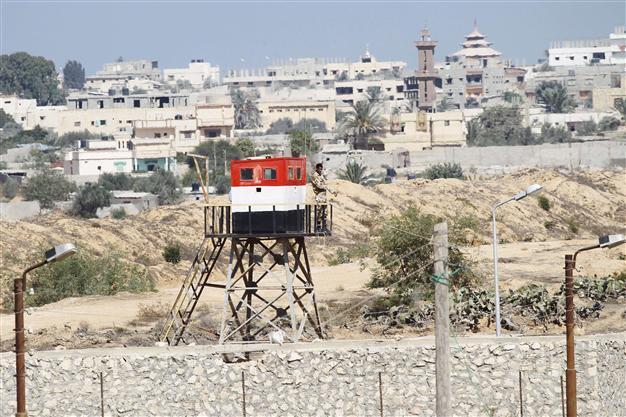Attacks after deadly Egypt protests shatter relative calm
CAIRO - Agence France-Presse

AFP Photo
Suspected militants killed nine people in attacks in Egypt on Monday, a day after clashes between Islamists and police left dozens dead and dashed hopes of restored calm after president Mohamed Morsi's ouster.In south Sinai, a car bomb explosion outside provincial police headquarters killed three policemen, the interior ministry said, and gunmen shot dead six soldiers near the Suez Canal city of Ismailiya.
The attacks came a day after Islamists, hoping to galvanise their flagging protest movement, clashed with police as they tried to march on a Cairo square steeped in symbolism.
Assailants firing rocket propelled grenades on Monday also damaged a satellite communication dish in Cairo that routes international calls, police said.
At least 51 people were killed the previous day in clashes, mostly in Cairo, in the worst violence in Egypt since mid-August when police dispersed two Islamist protest camps.
Police, joined by civilians opposed to the Islamists, fired tear gas and shots at the protesters when they tried to reach Tahrir Square in central Cairo. Police say the Islamist protesters used firearms in the clashes.
The renewed violence appeared aimed at frustrating plans by the military-installed government to move ahead three months after Morsi's overthrow by the military.
With its economy propped up by aid from Arab Gulf countries, the interim government has sought to persuade investors and tourists to return to the country.
Since Morsi's overthrow and detention, police have arrested more than 2,000 of his Islamist supporters and the military has sought to quell a wave of militant attacks in north Sinai.
But following several weeks of relative calm, the violence in the past 48 hours in the capital and south Sinai, which is dotted with tourist resorts, has shattered the appearance of restored security.
The Islamist coalition behind Sunday's protests has called for further protests on Friday to converge on the same square, Tahrir, in central Cairo.
"No one will prevent us from going there, regardless of the sacrifices," the Anti-Coup Alliance said in a statement late Sunday.
The square, where the military had held celebrations on Sunday to mark 40 years since the Arab-Israeli war, is highly symbolic for both supporters and opponents of Morsi.
Hundreds of thousands of people had filled the square in February 2011 to force president Hosni Mubarak to resign, and again last June and July to urge the army to depose his successor Morsi.
Taking the square, which is guarded by police and military now, would thrust Morsi's Islamist backers back in the spotlight, analysts said.
"There was a lot of pressure on the Muslim Brotherhood to say they are still here and they are a powerful force in society able to mobilise masses," said Shadi Hamid, director of research at the Brookings Doha Centre.
"I think it's implicit, this idea that there can't be stability without them being part of process, that if you're going to try to push them out that's going to undermine Egypt's economic recovery and any kind of return to normalcy," he said of the Islamists' strategy.
Western efforts at mediation between the military-installed government and Morsi's Muslim Brotherhood movement had failed before the government decided to disperse their Cairo protest camps on August 14.
More than 1,000 people were killed in the operation and ensuing days of clashes, which also led to an unprecedented crackdown on the Islamists.
In her third trip to Egypt last week since Morsi's ouster, EU foreign policy chief Catherine Ashton called for political "inclusiveness", but appeared intent on reassuring the government of European support. The Islamists "don't really have many options beyond sustaining protests over a longer period of time," Hamid said.
The government has accused the Brotherhood of involvement in militant attacks in Sinai that have killed dozens of soldiers and police, and attacks on churches across the country.
But the militants, some linked to Al-Qaeda, appear to have no ties with the more moderate Brotherhood movement.
The military claims it has killed dozens of militants in an extensive operation in north Sinai. But Monday's bombing in the south of peninsula showed the militants could still strike, this time about 100 kilometres (62 miles) from one of the country's main Red Sea tourist resorts, Sharm el-Sheikh.
A spate of bombings in south Sinai resorts between 2004 and 2006 severely crippled the tourism industry, one of Egypt's main earners.
















